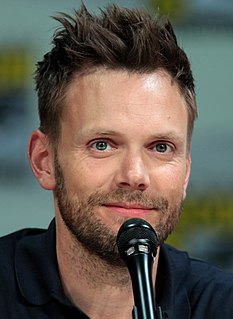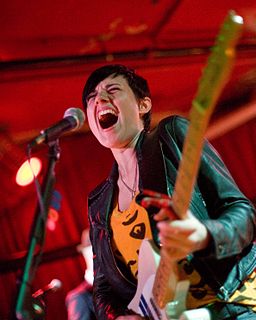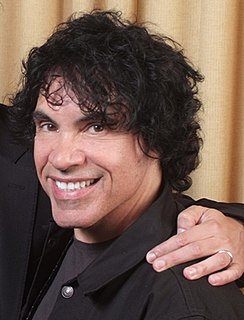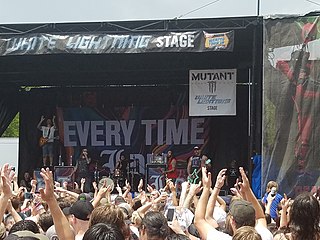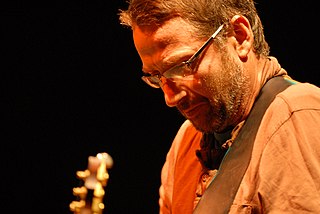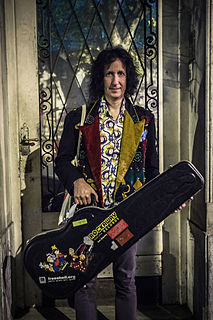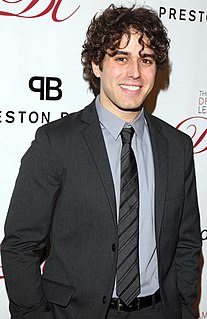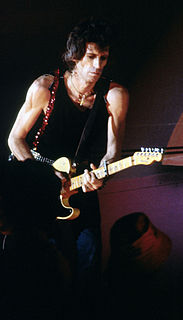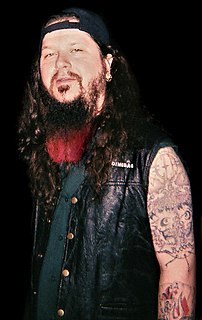Top 136 Riff Quotes & Sayings - Page 3
Explore popular Riff quotes.
Last updated on April 17, 2025.
There is a discrepancy of somebody going to an art dealer and promising what they'll make for the next three years. And I'm old fashioned that way; I think that every exhibition you make is supposed to put you in the world, that the next exhibition is spinning off of that. It's almost like a riff. And if you know what you're going to do for the next three years, why don't just do it the final point? You would think, in a progressive situation, that the final would be the best.
I don't know how (producer) Dan Harmon put that together but he did. Everyone gets along and we all babysit Chevy Chase (laughs) and it all works out. Plus we are given a lot of freedom to riff off each other and compliment each other's comedic style. The group is so talented, whether it be Donald Glover or Allison Brie and now Jim Rash who plays the Dean is finally a full member of the cast - oh my gosh, he is so funny. I call him Rumplestiltskin; he can spin comedy out of anything. I am in such a blessed situation - if only more people would watch it.
I usually start with a guitar riff or some little pattern of chords, and then I kind of go from there. Usually my lyrics are the last thing to go onto a song. For years and years I only ever did instrumental, so I'm still trying to get confidant with my lyrics and find the right balance. I'll generally get inspired from the music. I'll have a guitar line, and then I'll have a melody line, and I hook the lyrics up to fit that rhythm. So, my lyrics to tend be very rhythmic as well. They work with the music rather than the music works around them.
There's a lot of craft in songwriting. The divine inspiration is when the idea comes. It may be a riff. It may be a word. It may be a phrase. It may be a title. Sometimes, in the best of both worlds, that divine inspiration extends through the whole song. I've literally sat down and written a song from beginning to end, almost complete lyrics and everything without ever stopping...in two minutes. The chorus of 'She's Gone' was like that.
I like to have a drink or two, but I cut down on that. It was getting a little out of control. Two of the guys in the band don't even drink at all. We just riff off each other man. We're just so, so eye-to-eye with our sense of humour that we can just sit in an empty room and entertain ourselves for hours.
I was working with D'Mile - he's amazing! And I don't know, it was like that guitar riff was so crazy to me, and so I think I was frustrated about something that happened earlier and I feel like I'm just a good guy, I don't cut people off, I don't really call people out when they do stuff that they should be called out on, and I'm just always the one being the bigger person. So, that day "Gangster" just came out. That's just how I feel in that day to day life.
The focus of my playing is the groove, and every time I find a new rhythm, I find I can write a bunch of new songs. Learning how to dance, or drum, or to swing my body in a new way is the fundamental way I find a new riff. Because when you learn to swing your body in a new way, you begin to swing with your instrument differently.
Gary Greenberg is a thoughtful comedian and a cranky philosopher and a humble pest of a reporter, equal parts Woody Allen, Kierkegaard, and Columbo. The Book of Woe is a profound, and profoundly entertaining, riff on malady, power, and truth. This book is for those of us (i.e. all of us) who've ever wondered what it means, and what's at stake, when we try to distinguish the suffering of the ill from the suffering of the human.
What interested me about Chuck Berry was the way he could step out of the rhythm part with such ease, throwing in a nice, simple riff, and then drop straight into the feel of it again. We used to play a lot more rhythm stuff. We'd do away with the differences between lead and rhythm guitar. You can't go into a shop and ask for a "lead guitar". You're a guitar player, and you play a guitar.
[Donald trump] was steamed about [Hillary] Clinton's suggestion that he might not be as rich as he says. So he ditched the email stuff and instead spend a couple of minutes defending the greatness of his income, his company, his debts, his bankers, his buildings - and then sort of forgot what he was talking about and wandered off into a riff about how terrible our infrastructure is.
The tweets are getting shorter, but the songs are still 4 minutes long. You're coming up with 140-character zingers, and the song is still 4 minutes long…I realized about a year ago that I couldn't have a complete thought anymore. And I was a tweetaholic. I had four million twitter followers, and I was always writing on it. And I stopped using twitter as an outlet and I started using twitter as the instrument to riff on, and it started to make my mind smaller and smaller and smaller. And I couldn't write a song.
Initially, I just used the guitar as a prop. I'd pose with it in front of a mirror in my Kiss makeup when I was skipping school. Then I figured out how to play the main riff to Deep Purple's 'Smoke on the Water' on just the E string. Next, my old man showed me how to play barre chords, and that's when things started getting really heavy.
The first time I ever thought about doing a film seriously, I was in London. I was about 17 years old. I was just standing in the street, a bit dazzled by an Antonioni bus wipe, which by the way are inherent in London, and I imagined a film set in London starting out with the riff from The Yardbird's "Heart Full of Soul", and now, how ever many years later, I've done it.
Many people think of me as just a riff guitarist, but I think of myself in broader terms. As a musician I think my greatest achievement has been to create unexpected melodies and harmonies within a rock and roll framework. And as a producer I would like to be remembered as someone who was able to sustain a band of unquestionable individual talent, and push it to the forefront during its working career. I think I really captured the best of our output, growth, change and maturity on tape - the multifaceted gem that is Led Zeppelin.

